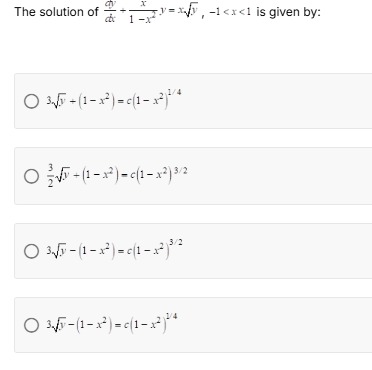Question
Question: The solution of $\frac{dy}{dx} + \frac{x}{1-x^2}y = x\sqrt{y}$, $-1<x<1$ is given by:...
The solution of dxdy+1−x2xy=xy, −1<x<1 is given by:

A
3y+(1−x2)=c(1−x2)1/4
B
23y+(1−x2)=c(1−x2)3/2
C
3y−(1−x2)=c(1−x2)3/2
D
3y−(1−x2)=c(1−x2)1/4
Answer
3y+(1−x2)=c(1−x2)1/4
Explanation
Solution
The given differential equation is a Bernoulli equation. We transform it into a linear first-order differential equation using the substitution v=y. After finding the integrating factor and solving the linear equation for v, we substitute back v=y and rearrange the terms to match the given options.
